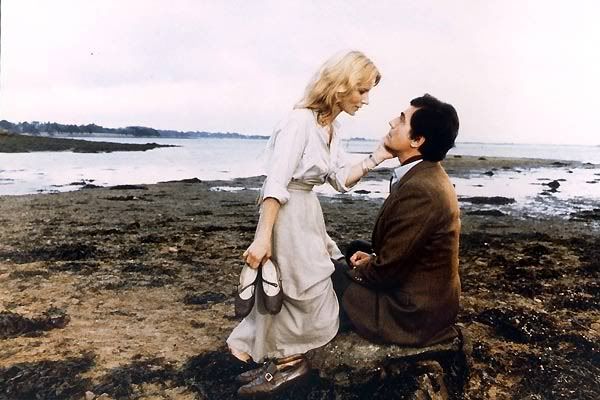Alain à la recherche #5: Mon oncle d'Amérique
by Ryland Walker Knight

[The Resnais series playing at the PFA this November and December is part of a broader, traveling retrospective with a concurrent run in Chicago at the Gene Siskel Film Center and a proposed stop at the newly renovated Museum of the Moving Image in early 2010.]
Parts of this film get me so giddy, marveling not just at the beautiful photography but also at the beautiful Nicole Garcia (above, on knee) and the silly-smart braiding, that I just don't believe it. Other parts are terrifically moving (i.e., sad). Most parts are didactic; as if its narrative strategy were a form of pedagogy engineered around constant recapitulation; as if Alain's saying, almost like he does throughout Marienbad, that if we say something specific enough times in enough voices then it's bound to burrow in there and register.
Everybody's got a story, and everybody's got dreams. Everybody's got a fantasy, an uncle from America. Except, of course, these people are decidedly French. In fact, we get a full from-birth history for each of our three leads—Garcia, Gerard Depardieu, Roger Pierre—each told a few times over. The film begins more a mosaic than Je t'aime, je t'aime rather literally as our eyes follow a spotlight searching a collage of stills we will know in motion later in the film. Then it's choral, too, our ears parsing these three—no, four—voices recounting their births and their birthplaces and their trajectories all at once all on top of one another—except for some omniscient voice telling us that a being's only purpose is being and/or something else tautological. Shortly, we're given faces to go with the voices, and names, and portraits of their childhood narrated by them. Then the net is cast over this trio: Resnais introduces Henri Laborit (a real-life physician, writer and philosopher) with the same kind of narration, but with "current" footage of Laborit walking around some lab, smiling and scowling. Laborit is a kind of guide, a sage, for the film. Not that the film exactly proves Laborit's theories—a version of evolutionary psychology intent on Explaining It All—but these asides help provide, say, an anatomy for the film to hang stories off of, like limbs.
The film is split, or splintered, or it splits a few times, or it's segmented, though it also finds conjunctions and convergences. In one (dim) light, it's simply didactic and over determined. Resnais never reduces, though, and the repetitions are never played the same—not from the same angle, often it's not even the same exact action but another performance altogether. Even more than the memory game of Marienbad, Mon oncle aims at redetermining events: how new information colors an old event, or a current one, and can influence understanding of putatively unrelated events. Put otherwise, the film is quite clearly about intentionality, and how we think about things, and where we come from when we come to things-people-places. No doubt, there's plenty of Ricoeur's traces in this project, even if it's based in Laborit's mouse traps. It's Resnais' cinematic gusto that frees the film from its unilateral "expertise" echoes and lets time move both—nigh, all—ways at once. Though Alain maps the mice onto the men and one woman we follow, it's not proof; it's a joke. It's a gas that it's a possibility, even a plausibility, in this world. —Jokes can scold!
Though agency seems crushed, to an extent, in this little network of forces, we never feel like life's not open. Rather, life's prone to fantasies, which can, plausibly and paradoxically, be a form of paralysis, an inhibition that blinds us to how we move ourselves (and must) and give each present purpose its purpose. Or, that becomes possible only if (we hope "when") we find a way to gather ourselves, to hold our histories at hand as some ciceroni, and not simply as stained glass. We remember: we tell ourselves stories in order to live.





No comments:
Post a Comment